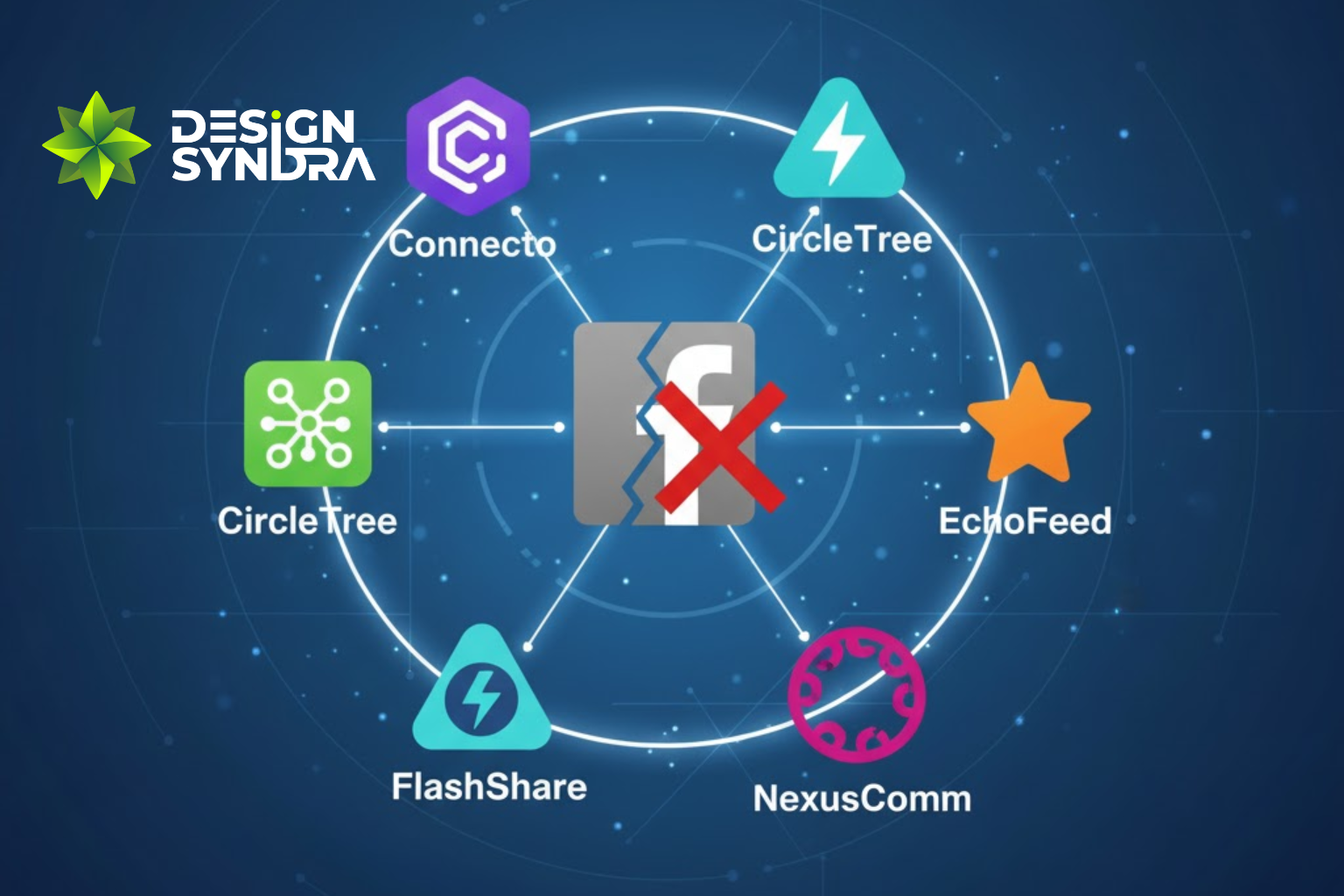Alternatives to Facebook for Social Media Users in 2026
In 2026, many people are rethinking their social media presence. Whether driven by privacy concerns, feed fatigue, algorithm changes, or a desire for smaller communities, users and brands alike are exploring Facebook alternatives that offer greater control, authenticity, and engagement. At Design Syndra, we've analyzed emerging platforms and trends that may define the next generation of social connection. This guide introduces top Facebook alternatives for 2026, explains what makes them stand out, and helps you decide where to migrate your digital life.
Why Facebook Alternatives Matter in 2026
Facebook has dominated social media for years, but user sentiment has shifted. Data privacy scandals, decreasing organic reach, and algorithm opacity have pushed many to reconsider. As social media evolves, people are seeking platforms with:
- Real control over data and feed
- Chronological or non-manipulated timelines
- Niche communities over mass audiences
- Transparent moderation and less ad overload
In 2026, switching to the right alternative can help you maintain meaningful connections, avoid opaque algorithms, and reclaim your digital space.
Key Criteria for Choosing a Worthy Facebook Alternative
Before picking a platform, here are critical factors to evaluate:
- Privacy & Data Ownership: You should control your data, not the platform.
- Feed Experience: Chronological, curated by interest, or community-driven feed models.
- Moderation & Governance: Transparent rules and community voice in policies.
- Interoperability & Decentralization: Ability to interact across networks (Fediverse, etc.).
- Sustainability for Creators & Brands: Monetization models and business features.
These factors ensure you pick a platform that aligns with your goals—whether personal, creative, or business.
Top Facebook Alternatives You Should Try in 2026
In addition to popular decentralized platforms like Mastodon, MeWe, Pixelfed, Diaspora, Mighty Networks, and Chimein, Telegram and Signal several new and innovative social platforms are redefining online community building and user interaction in 2026. These emerging Facebook alternatives offer users more privacy, creativity, and authenticity, helping individuals and brands connect meaningfully without intrusive algorithms or data exploitation.
Below are eight standout Facebook alternatives that deserve your attention this year.
Mastodon – Decentralized & Community-Driven
Mastodon is a federated microblogging network where users join independent servers (instances) yet interact across them using the ActivityPub protocol.
Why it's an alternative to Facebook:
- You pick the community (instance) you trust
- No overarching algorithm manipulating your feed
- Strong focus on moderation and community values
- Cross-instance interaction with other Fediverse platforms
Considerations:
- Learning curve for choosing proper instances
- Instance rules differ (some strict, some permissive)
If you're tired of Facebook's opaque systems, Mastodon gives control back to users.
Pixelfed – Fediverse's Image-First Network
Pixelfed is a decentralized alternative to Instagram, built on the same Fediverse principles.
Standout features:
- Chronological photo feed with no algorithm pushing content
- Privacy-first design with no tracking and no invasive ads
- Supports server-to-server interaction across the Fediverse
- Great for creators, photographers, and visual storytellers
Pixelfed can become your go-to for image-based social connection without the typical social media compromises.
MeWe – Privacy-Focused Social Network
MeWe markets itself as a "Facebook minus the tracking."
What it offers:
- Groups, feeds, chat, events—just like Facebook
- Minimal or no ad targeting
- Emphasis on user privacy and ownership
- Optional premium features (not forced)
Possible drawbacks:
- Smaller network (less reach than Facebook)
- Less advanced algorithmic features
For users who want a familiar social experience without invasive data usage, MeWe is a solid alternative.
Diaspora – User-Owned Pods & Decentralized Structure
Diaspora is another privacy-conscious network built on pods (servers) that users host themselves or join.
Key benefits:
- You choose or host the pod you trust
- Full ownership of your data
- Pseudonym support without forced identity
- Interaction across pods
Though smaller than mainstream platforms, Diaspora appeals to those who value full control and decentralization.
Mighty Networks – Build Your Own Private Community
Mighty Networks has rapidly become one of the most powerful Facebook alternatives for community builders and small business owners. Instead of relying on public feeds or ads, it lets you create a private, branded social space where members can interact, learn, and grow together.
Why It's a Great Facebook Alternative:
- Own your community — full control over branding, membership, and rules.
- Monetization tools — sell memberships, online courses, or events directly inside your network.
- Zero algorithm interference — your members see what matters most without clutter.
- Integrated apps — host discussions, livestreams, polls, and content libraries all in one place.
For entrepreneurs, coaches, and creators who want to move their Facebook groups to a cleaner, ad-free space, Mighty Networks is an exceptional option. It encourages genuine engagement, knowledge sharing, and long-term brand loyalty, all under your control.
Chime.In – A Social Network Focused on Thoughtful Sharing
Chime.In (relaunched with modern updates in 2025) takes a unique approach to social interaction—it rewards users for creating meaningful conversations instead of endless scrolling. Designed for people who prefer substance over noise, it blends community-driven discussion with a positive, idea-centered environment.
Key Features of Chime.In:
- Interest-based hubs — follow topics that matter to you, from tech innovation to art and lifestyle.
- Ad-light experience — limited advertising to preserve authenticity and focus.
- Creator recognition — users can earn visibility for insightful posts and discussions.
- Collaborative sharing — group boards and public chimes for community participation.
If you're looking for a more intelligent, content-driven social alternative to Facebook, Chime.In brings back what social media was meant to be—a space for thoughtful communication and real human connection.
Telegram and Signal – Secure Messaging Meets Social Connection
While Telegram and Signal are primarily known as private messaging apps, both platforms are evolving into multi-purpose social ecosystems, a major trend for 2026. They allow communities, businesses, and influencers to engage with audiences securely, without relying on ad-based algorithms or invasive tracking.
Why Telegram and Signal Stand Out:
- Unmatched privacy — both platforms use end-to-end encryption and strong security protocols.
- Community features — Telegram's channels and groups allow large-scale audience interaction.
- Cross-device synchronization — seamless communication across mobile, desktop, and web.
- No algorithmic feed — chronological updates ensure transparency and trust.
- No data selling — user information is never used for targeted ads.
Telegram has become particularly popular for creator communities, news outlets, and brand channels, while Signal remains the go-to platform for users prioritizing privacy and encrypted communication.
These apps represent the growing shift from public social media toward private social networking, where users decide what to share and with whom.
Bonus Tip from Design Syndra
At Design Syndra, we help creators, influencers, and small businesses transition from traditional social media to modern community platforms like Mighty Networks and Telegram. By focusing on authenticity, privacy, and consistent engagement, we guide brands to grow meaningful audiences while future-proofing their digital strategies for 2026 and beyond.
Emerging Platforms to Watch in 2026
The social media landscape is not static. Here are some newcomers catching attention:
- Bluesky — Built on the AT Protocol, it promises decentralized control with a clean UI.
- Secure Scuttlebutt (SSB) — A peer-to-peer social protocol where each user hosts their content.
- Nospace — A retro, customizable social hub reflecting early social media vibes (waiting list buzz).
- Locket — A widget-style photo sharing app that emphasizes personal, close-friend sharing.
These platforms are still evolving, but they represent important shifts in how people want social media to feel and function.
How to Migrate from Facebook Without Losing Your Community
Transitioning to a new platform doesn't have to be painful. Here's a roadmap:
- Audit & archive content — Download full backup of your posts, photos, friends list.
- Begin a dual presence — Maintain both Facebook and a new platform for a gradual shift.
- Announce your move — Tell your community where to find you next (link profiles).
- Recreate core groups/communities — Start with your most engaged followers.
- Adapt content style — Platforms have different norms (no constant broadcasting, more engagement).
- Leverage cross-posting tools — Where allowed, publish to both platforms during the transition.
- Monitor feedback & adjust — Listen to followers, iterate strategy quickly.
If you handle the migration thoughtfully, many loyal followers will follow you to your new home.
Best Practices for Success on New Social Platforms
Switching platforms means adapting your social behavior as well. Here are practices to ensure you thrive:
- Engage, don't broadcast — Respond, comment, build relationships.
- Participate in niche communities — Smaller interest-based groups often offer deeper connections.
- Use platform-native features (threads, local hashtags, instance-level events).
- Respect moderation culture — Smaller networks often have stricter community rules.
- Keep optimizing — Track reach, engagement, and audience migration to refine your strategy.
These habits help you not just survive but stand out on alternative social networks.
Pros & Trade-offs of Moving Away from Facebook
Pros:
- More privacy and control
- Less algorithm manipulation
- More authentic, community-level interactions
- New creative freedom and potential early adopter advantage
Trade-offs:
- Smaller audience and reach (at first)
- Less polished tools or monetization options
- Learning new platform norms
- Fragmented network (multiple platforms to manage)
Weighing these pros and trade-offs honestly will help you commit to the right path.
Why Design Syndra Advocates Diversifying Your Social Presence
At Design Syndra, we believe robust digital presence is not tied to a single platform. A diversified strategy ensures:
- Resilience if one platform changes rules
- Better control over audience and content
- Early positioning on rising networks
- Stronger relationships through authenticity
We help clients plan cross-platform content, optimize for each network's style, and migrate communities strategically.
Quick FAQ — Facebook Alternatives in 2026
Q: Which alternative is best for privacy?
Platforms like Mastodon, Diaspora, and Secure Scuttlebutt rank highest for privacy and data ownership.
Q: Will my followers move with me?
Some will. The transition strategy (announcement, dual posting) helps retain the core community.
Q: Are brands active on these platforms?
Yes—brands exploring authenticity, niche marketing, and early mover advantage are already experimenting.
Q: Do new platforms monetize?
Some do—via subscriptions, tipping, or limited ad models rather than invasive tracking.
Final Thoughts: The Future of Social Media Starts Beyond Facebook
In 2026 and beyond, social media success won't depend on being on the biggest platform, it will depend on being where your community wants to engage. The Facebook alternatives above offer fresh potential: privacy, control, community, and authenticity.
If you're ready to explore this future, Design Syndra is here to help you evaluate, migrate, and thrive on platforms that align with your values and goals. Don't just follow the crowd, lead your community to new digital frontiers.



